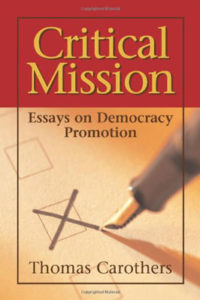 The global democratic regression is leading to a reconsideration of advancing democracy as a strategic objective of U.S. foreign policy, according to a new analysis from the Congressional Research Service.
The global democratic regression is leading to a reconsideration of advancing democracy as a strategic objective of U.S. foreign policy, according to a new analysis from the Congressional Research Service.
“To the extent that there are differences in interest in democracy promotion between Members of Congress and the executive branch, these considerations may also entail questions about the institutional role of Congress in democracy promotion and in U.S. foreign policy generally,” the report concludes.
“Many analysts have argued for what they consider to be more  strategic targeting of democracy promotion resources, particularly in light of funding constraints. Some argue that such targeting is important because of perceived competing and more narrowly concentrated democracy-eroding external influences in some countries,” notes CRS foreign affairs analyst Michael A. Weber, author of Global Trends in Democracy: Background, U.S. Policy, and Issues for Congress. A “triage” approach that weighs potential downside risks when determining which countries the United States should prioritize for democracy promotion could potentially help inform funding allocations, he suggests:
strategic targeting of democracy promotion resources, particularly in light of funding constraints. Some argue that such targeting is important because of perceived competing and more narrowly concentrated democracy-eroding external influences in some countries,” notes CRS foreign affairs analyst Michael A. Weber, author of Global Trends in Democracy: Background, U.S. Policy, and Issues for Congress. A “triage” approach that weighs potential downside risks when determining which countries the United States should prioritize for democracy promotion could potentially help inform funding allocations, he suggests:
Analysts contend that these allocations may be usefully informed by criteria such as whether programs can be coupled with broader diplomatic efforts and/or whether conducive structural conditions are present. Given recent democratic backsliding within existing democracies, some scholars have also warned against prematurely cutting off aid to new democracies. Researchers have found that democracy programs are more effective when their goals align with broader U.S. policy and are supported by the use of diplomatic tools such as sanctions or aid conditionality. Congress has a direct role in shaping these tools.
 “Some experts have also argued for a more differentiated allocation of democracy promotion resources between the major funders (including USAID, the State Department, and the National Endowment for Democracy) based on the particular strengths of their funding models in relation to the type of project to be funded and the extent of political openness in the target country,” Weber adds.
“Some experts have also argued for a more differentiated allocation of democracy promotion resources between the major funders (including USAID, the State Department, and the National Endowment for Democracy) based on the particular strengths of their funding models in relation to the type of project to be funded and the extent of political openness in the target country,” Weber adds.
“Looking forward, the trends analyzed and described in this report likely portend continued near-term constraints on democratic expansion around the world, and in some cases have the potential to pose a range of persistent challenges for policymakers,” the report states:
 Congress may continue to grapple with policy considerations within and in light of this difficult context in the near future [and] some of these considerations may relate to the overarching strategic orientation of U.S. foreign policy and democracy promotion’s place within that, while others concern second order questions about particular means, resources, and resource allocation. To the extent that there are differences in interest in democracy promotion between Members of Congress and the executive branch, these considerations may also entail questions about the institutional role of Congress in democracy promotion and in U.S. foreign policy generally.
Congress may continue to grapple with policy considerations within and in light of this difficult context in the near future [and] some of these considerations may relate to the overarching strategic orientation of U.S. foreign policy and democracy promotion’s place within that, while others concern second order questions about particular means, resources, and resource allocation. To the extent that there are differences in interest in democracy promotion between Members of Congress and the executive branch, these considerations may also entail questions about the institutional role of Congress in democracy promotion and in U.S. foreign policy generally.
Russia and China are distrustful of Western efforts to promote democracy, civil society, and human rights around the world and see them as attempts to weaken their authoritarian regimes, writes Torrey Taussig, Nonresident Fellow in Foreign Policy at the Brookings Center on the United States and Europe. Each would prefer a “spheres of influence” international system rather than the current U.S.-led order and network of military alliances that limit their regional ambitions in Europe and Asia.
Rising authoritarian influence is impeding democratic advances, the CRS report suggests, citing Sharp Power: Rising Authoritarian Influence, a December 2017 report from the National Endowment for Democracy’s International Forum for Democratic Studies. It also highlights attacks on civil society, with reference to the June 2012 report on Defending Civil Society from the International Center for Not-for-Profit Law & World Movement for Democracy.







